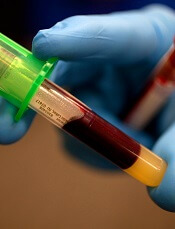User login
The US Food and Drug Administration (FDA) has made available a panel of human plasma samples that can be used to evaluate serological tests for detecting Zika virus infection.
The panel consists of plasma samples from anonymous individuals infected with Zika, West Nile, or dengue viruses.
Diagnostic developers can use the panel to assess whether their tests can help distinguish recent Zika virus infection from infection with West Nile or dengue.
The panel is available to developers who have interacted with the FDA and are seeking Emergency Use Authorization (EUA) for devices that are in the final stages of validation.
Other developers interested in requesting a panel may contact the FDA at CDRH-ZIKA-Templates@fda.hhs.gov.
The agency said the panel can also be used to compare the performance of Zika virus tests that are already available under an EUA.
To date, the FDA has granted EUAs to 3 serological tests for detection of recent Zika virus infection: Zika MAC-ELISA, ZIKV Detect IgM Capture ELISA, and LIAISON XL Zika Capture IgM Assay.
“At the onset of the Zika virus outbreak, when little was known about the disease or how to diagnose it, the FDA worked quickly with manufacturers to encourage the development of diagnostic tests and ensure they were available using its Emergency Use Authorization authorities,” said FDA Commissioner Scott Gottlieb, MD.
“By providing manufacturers of these tests with standardized patient samples to use in properly validating these diagnostics, we will be able to better assess how well their tests perform. This is part of our effort to ultimately bring these tests through the FDA’s formal review process to better ensure their reliability, and to enable broader access to Zika diagnostic testing.”
The FDA panel was prepared using samples from Zika virus-infected individuals provided by Blood Systems Research Institute. The samples from individuals infected with dengue and West Nile virus were obtained separately. ![]()
The US Food and Drug Administration (FDA) has made available a panel of human plasma samples that can be used to evaluate serological tests for detecting Zika virus infection.
The panel consists of plasma samples from anonymous individuals infected with Zika, West Nile, or dengue viruses.
Diagnostic developers can use the panel to assess whether their tests can help distinguish recent Zika virus infection from infection with West Nile or dengue.
The panel is available to developers who have interacted with the FDA and are seeking Emergency Use Authorization (EUA) for devices that are in the final stages of validation.
Other developers interested in requesting a panel may contact the FDA at CDRH-ZIKA-Templates@fda.hhs.gov.
The agency said the panel can also be used to compare the performance of Zika virus tests that are already available under an EUA.
To date, the FDA has granted EUAs to 3 serological tests for detection of recent Zika virus infection: Zika MAC-ELISA, ZIKV Detect IgM Capture ELISA, and LIAISON XL Zika Capture IgM Assay.
“At the onset of the Zika virus outbreak, when little was known about the disease or how to diagnose it, the FDA worked quickly with manufacturers to encourage the development of diagnostic tests and ensure they were available using its Emergency Use Authorization authorities,” said FDA Commissioner Scott Gottlieb, MD.
“By providing manufacturers of these tests with standardized patient samples to use in properly validating these diagnostics, we will be able to better assess how well their tests perform. This is part of our effort to ultimately bring these tests through the FDA’s formal review process to better ensure their reliability, and to enable broader access to Zika diagnostic testing.”
The FDA panel was prepared using samples from Zika virus-infected individuals provided by Blood Systems Research Institute. The samples from individuals infected with dengue and West Nile virus were obtained separately. ![]()
The US Food and Drug Administration (FDA) has made available a panel of human plasma samples that can be used to evaluate serological tests for detecting Zika virus infection.
The panel consists of plasma samples from anonymous individuals infected with Zika, West Nile, or dengue viruses.
Diagnostic developers can use the panel to assess whether their tests can help distinguish recent Zika virus infection from infection with West Nile or dengue.
The panel is available to developers who have interacted with the FDA and are seeking Emergency Use Authorization (EUA) for devices that are in the final stages of validation.
Other developers interested in requesting a panel may contact the FDA at CDRH-ZIKA-Templates@fda.hhs.gov.
The agency said the panel can also be used to compare the performance of Zika virus tests that are already available under an EUA.
To date, the FDA has granted EUAs to 3 serological tests for detection of recent Zika virus infection: Zika MAC-ELISA, ZIKV Detect IgM Capture ELISA, and LIAISON XL Zika Capture IgM Assay.
“At the onset of the Zika virus outbreak, when little was known about the disease or how to diagnose it, the FDA worked quickly with manufacturers to encourage the development of diagnostic tests and ensure they were available using its Emergency Use Authorization authorities,” said FDA Commissioner Scott Gottlieb, MD.
“By providing manufacturers of these tests with standardized patient samples to use in properly validating these diagnostics, we will be able to better assess how well their tests perform. This is part of our effort to ultimately bring these tests through the FDA’s formal review process to better ensure their reliability, and to enable broader access to Zika diagnostic testing.”
The FDA panel was prepared using samples from Zika virus-infected individuals provided by Blood Systems Research Institute. The samples from individuals infected with dengue and West Nile virus were obtained separately. ![]()

